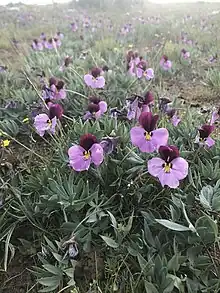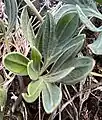| Viola trinervata | |
|---|---|
 | |
| Scientific classification | |
| Kingdom: | Plantae |
| Clade: | Tracheophytes |
| Clade: | Angiosperms |
| Clade: | Eudicots |
| Clade: | Rosids |
| Order: | Malpighiales |
| Family: | Violaceae |
| Genus: | Viola |
| Species: | V. trinervata |
| Binomial name | |
| Viola trinervata (Howell) Howell ex A.Gray | |
Viola trinervata, the sagebrush violet, is a species of wildflower in the Violaceae family which is found in eastern Washington and Oregon.[1]
Description
Sagebrush violet is a low growing perennial herb that produces a cluster of palmate leathery leaves with prominent veins. Each palmate leaf appears at the end of a hairless stem emerging from the ground, and each leaflet has three prominent veins (whence trinervata), one in the center and two of them at or close to each leaflet edge. The showy flowers form in the spring and arise singly from basal stems. The upper two flower petals are dark purple and the lower three petals are a paler lilac (sometimes white) with a yellow base, often with radiating darker purple lines.[2] Full technical description at Flora of North America.[3]
Range and habitat
The sagebrush violet grows in seasonally moist big sagebrush habitat and nearby rocky hillsides on the Columbia River plateau in Washington and Oregon states at elevations of 400 to 1200 meters.[2] Though the range of the sagebrush violet is not extensive, it is often locally common.
Ecology
The sagebrush violet seeds have a fleshy elaiosome, suggesting that they are dispersed in part by ants.[3]
Gallery
 Viola trinervata flower closeup
Viola trinervata flower closeup White flower form
White flower form Leaf closeup
Leaf closeup
References
- ↑ "Viola trinervata". iNaturalist. Retrieved 2023-01-12.
- 1 2 Hitchcock, C.L. and Cronquist, A. 2018. Flora of the Pacific Northwest, 2nd Edition, p. 231. University of Washington Press, Seattle.
- 1 2 "Flora of North America: Viola trinervata".